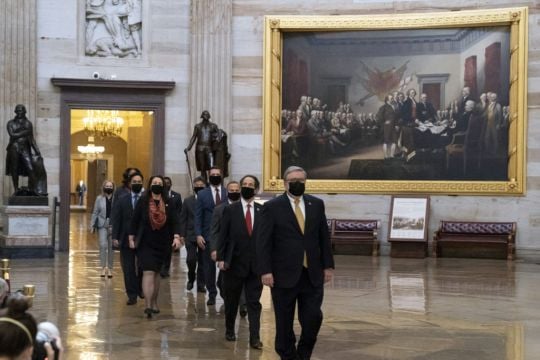Donald Trump’s historic second impeachment trial opened in the US Senate with graphic video of the deadly January 6 attack on Congress and the defeated former president whipping up a rally crowd — “We’re going to walk down to the Capitol!” — as he encouraged a futile fight over his presidency.
The lead House prosecutor told senators the case would present “cold, hard facts” against Mr Trump, who is charged with inciting the siege of the Capitol to overturn the election he lost to Democrat Joe Biden.
Senators sitting as jurors, many who themselves fled for safety that day, watched the jarring video of the chaotic scene, rioters pushing past police to storm the halls, Trump flags waving.
“That’s a high crime and misdemeanour,” said Representative Jamie Raskin, in opening remarks.
“If that’s not an impeachable offence, then there’s no such thing.”
Senators agreed on Tuesday to consider the case, rejecting an attempt by the former president’s defence team and some Republican allies to halt the trial because he is no longer in office.
The vote was 56-44 on the question of whether the Senate has jurisdiction and could proceed.
Mr Trump is the first president to face impeachment charges after leaving office and the first to be twice impeached.
The Capitol siege stunned the world as rioters ransacked the building to try to stop the certification of Mr Biden’s victory, a domestic attack on the nation’s seat of government unlike any in its history.
Five people died.
Acquittal is likely, but the trial will test the nation’s attitude toward his brand of presidential power, the Democrats’ resolve in pursuing him, and the loyalty of Mr Trump’s Republican allies defending him.
Mr Trump’s lawyers are insisting that he is not guilty of the sole charge of “incitement of insurrection”, his fiery words just a figure of speech as he encouraged a rally crowd to “fight like hell” for his presidency.
But prosecutors say he “has no good defence” and they promise new evidence.
“Hear ye, hear ye, hear ye,” the acting sergeant at arms intoned to start the trial.
Security remained extremely tight at the Capitol, a changed place after the attack, fenced off with razor wire and armed National Guard troops on patrol.
The nine House managers walked across the shuttered building to prosecute the case before the Senate.
White House press secretary Jen Psaki said that Mr Biden would not be watching the trial of his predecessor.

“Joe Biden is the president, he’s not a pundit, he’s not going to opine on back and forth arguments,” she said.
Mr Trump’s defence team has focused on the question of constitutionality, which could resonate with Republicans eager to acquit Mr Trump without being seen as condoning his behaviour.
But the House prosecutors argued there is no “January exception” for a president on his way out the door.
Representative Joe Neguse, a Democrat, referred to the corruption case of William Belknap, a war secretary in the Grant administration, who was impeached, tried and ultimately acquitted by the Senate after leaving office.
“President Trump was not impeached for run of the mill corruption, misconduct. He was impeached for inciting a violent insurrection – an insurrection where people died, in this building,” Mr Neguse said.
“If Congress stands by, it would invite future presidents to use their power without any fear of accountability.”

It appears unlikely that the House prosecutors will call witnesses, in part because the senators were witnesses themselves.
At his Mar-a-Lago club in Florida, Mr Trump has declined a request to give evidence.
Mr Trump’s defence team has said it plans to counter with its own cache of videos of Democratic politicians making fiery speeches.
“We have some videos up our sleeve,” senior Trump adviser Jason Miller said on a podcast.
“In trying to make sense of a second Trump trial, the public should keep in mind that Donald Trump was the first president ever to refuse to accept his defeat,” said Timothy Naftali, a clinical associate professor at New York University and an expert on impeachment.
“This trial is one way of having that difficult national conversation about the difference between dissent and insurrection,” Mr Naftali said.
The chamber is divided 50-50 between Democrats and Republicans, with a two-thirds vote, 67 senators, required for conviction.

A similar question was posed late last month, when Senator Rand Paul of Kentucky forced a vote to set aside the trial because Mr Trump was no longer in office.
At that time, 45 Republicans voted in favour of Mr Paul’s measure.
Just five Republicans joined with Democrats to pursue the trial: Mitt Romney of Utah, Ben Sasse of Nebraska, Susan Collins of Maine, Lisa Murkowski of Alaska and Pat Toomey of Pennsylvania.
Presidential impeachment trials have been conducted only three times before, leading to acquittals for Andrew Johnson, Bill Clinton and then Mr Trump last year.
Typically senators sit at their desks for such occasions, but the Covid-19 crisis has upended even this tradition.
Instead, senators will be allowed to spread out, in the “marble room” just off the Senate floor, where proceedings will be shown on TV, and in the public galleries above the chamber, to accommodate social distancing, according to a person familiar with the discussions.
Presiding is not the Chief Justice of the Supreme Court, as has been tradition for the nation’s few presidential impeachment trials, but the chamber’s senior-most member of the majority party, Senator Patrick Leahy of Vermont.







